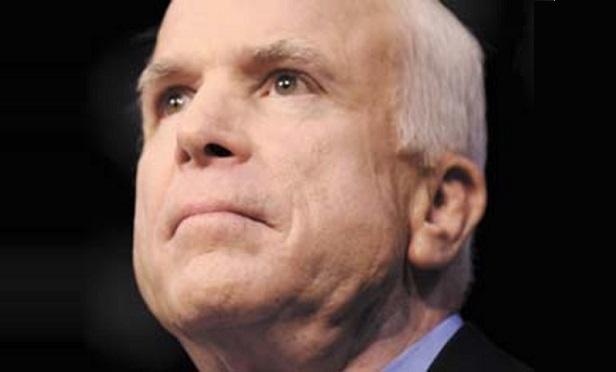 In one of his manyshots at McCain over the issue, President Trump said that but forhis vote, “We almost got rid of Obamacare.” (Photo: ALMFile)
In one of his manyshots at McCain over the issue, President Trump said that but forhis vote, “We almost got rid of Obamacare.” (Photo: ALMFile)
Jason Lewis, a Republican congressman from Minnesota who justlost his re-election bid, has come up with a counterintuitive takeon the Democratic takeover of the House: It's thefault of John McCain, the Republican senator fromArizona who died in August.
|McCain's July 2017 vote against Republican legislation torepeal and replace Obamacare, Lewis argues,deprived Republicans of the ability to prove the critics of thatlegislation wrong.
|Related: GOP candidates sprinting away from ACArepeal
|Lewis is being panned for blaming his and others' defeats on adead man, especially a war hero, and even more especially for doingit in an op-ed that appeared on Veterans Day. Leaving questions oftaste aside, there are glaring flaws in Lewis's argument. But let'sgive Lewis his due before going into them. It is not impossible, asparadoxical as it may sound, that passing highly unpopularlegislation might have helped Republicans.
|Lewis has a reasonable case on that point, although heoverstates it. Passage would not have made Republican legislationpopular, but could well have undercut the ubiquitous predictions ofits catastrophic effects.
|Various iterations of the legislation were said to be likely tocause 22 million or 23 million people to lose their healthinsurance. That wouldn't have happened: The claim was based on adistortion of a Congressional Budget Office projection. The CBOlater tacitly admitted that the projection was too high, and someof the projected losses were supposed to take longer to materializethan most people realized.
|Passage of legislation might also have made it clearer thatstates were not going to start a stampede to deprive people withpre-existing conditions of protections — and that Republicanlegislation required all states to maintain a significant degree ofprotection.
|On the other hand, Lewis discounts the possibility thatRepublicans would have paid a price at the ballot box because theirlegislation would have allowed insurers to raise premiums fornear-retirees and cut them for younger people. That trade-off mayhave made sense as a policy, but older people would have beenunhappy and more likely to vote on the issue.
|While Lewis is uncharitable in attributing McCain's vote to hispersonal hostility toward Trump, it is also true that McCain'sstated grounds for that vote were hard to reconcile with otheraspects of his record. He said he wanted a more regular legislativeprocess in which Obamacare legislation would move throughcongressional committees and pass with bipartisan support.
|Since there was no way that Democrats were going to agree to anyconservative or center-right Obamacare replacement, that amountedto saying that he was in practical terms willing to see Obamacarecontinue. It was very far from his previous campaign pledge to leadthe fight against the health-care law.
|By the time McCain voted no, the Republican legislation had beenstripped down to a repeal of Obamacare's fines on people whodeclined to purchase insurance compliant with the law'sregulations. Republicans hoped to take that “skinny repeal” to aconference committee with the House, which had passed wider-rangingchanges to Obamacare, and then pass a new bill through bothchambers.
|This procedural history is worth keeping in mind for tworeasons.
|The first is that it makes McCain's decision harder to defend. Afew months later he would express his support for a Republican taxlaw that got rid of those fines, too — a law that, in other words,had the same key provision as the bill he killed. Since he had noserious objection to the skinny bill's actual substance, he couldhave voted yes in July and then waited to see whether theconference committee devised something worth enacting.
|The second is that it means that Republicans weren't actuallyclose to the finish line on health-care legislation. Lewis isneither the first nor the most prominent Republican to encouragethe misimpression that but for McCain, Republicans were sure toachieve victory on health care. In one of his many shots at McCainover the issue, President Trump said that but for his vote, “Wealmost got rid of Obamacare.”
|No, they didn't. Republicans couldn't come up with an Obamacareoverhaul with majority support in the Senate. That's why they werereduced to the desperate procedural gimmick of skinny repeal.
|If Republicans had some version of Obamacare legislation thatcould win 51 Senate votes, they would have passed that bill beforea conference. A committee was not going to devise an attractive newapproach to health policy that none of the senators had previouslyimagined. The gambit was based on something pretty close to magicalthinking.
|Senator McCain certainly did not help the party get health-carelegislation enacted, and his decisions were open to criticism. (Thesame is true, by the way, of the other Senate Republicans who votedno: Susan Collins of Maine and Lisa Murkowski of Alaska, whohaven't gotten as much criticism from Trump as McCain did becauseit's the late senator's biting criticism of the president that thelatter really resented.)
|But McCain has functioned as a scapegoat for broader failures byhis party on health care. What Lewis is doing now is making him ascapegoat for the midterm elections, too.
Ramesh Ponnuru is a Bloomberg Opinioncolumnist. He is a senior editor at National Review, visitingfellow at the American Enterprise Institute and contributor to CBSNews. This column does not necessarily reflect the opinion of theeditorial board or Bloomberg LP and its owners.
|Copyright 2018 Bloomberg. All rightsreserved. This material may not be published, broadcast, rewritten,or redistributed.
Complete your profile to continue reading and get FREE access to BenefitsPRO, part of your ALM digital membership.
Your access to unlimited BenefitsPRO content isn’t changing.
Once you are an ALM digital member, you’ll receive:
- Critical BenefitsPRO information including cutting edge post-reform success strategies, access to educational webcasts and videos, resources from industry leaders, and informative Newsletters.
- Exclusive discounts on ALM, BenefitsPRO magazine and BenefitsPRO.com events
- Access to other award-winning ALM websites including ThinkAdvisor.com and Law.com
Already have an account? Sign In
© 2024 ALM Global, LLC, All Rights Reserved. Request academic re-use from www.copyright.com. All other uses, submit a request to [email protected]. For more information visit Asset & Logo Licensing.








